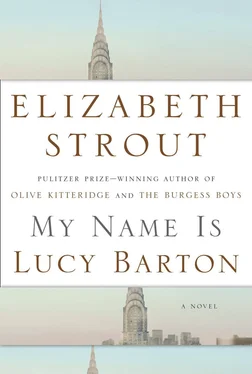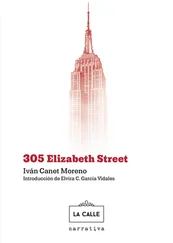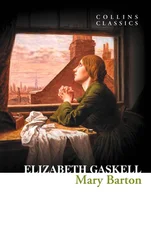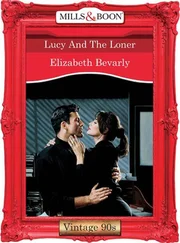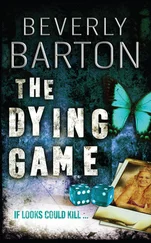“Told you?”
“You know your father was in the war, and some German men tried to kill him. He’s been having a terrible time from the moment he saw William.”
“I know Daddy was in the war,” I said. “But he never talked about any of that.”
“There are two kinds of men when it comes to their war experience,” my mother said. “One talks of it, one doesn’t. Your father belongs to the group who doesn’t.”
“And why is that?”
“Because it wouldn’t be decent,” my mother said. Adding, “Who in God’s name brought you up?”
It was not until many years later, long after, that I learned from my brother how my father, in a German town, had come upon two young men who startled him, and my father had shot them in the back, he did not think they were soldiers, they were not dressed like soldiers, but he had shot them, and when he kicked one over he saw how young he was. My brother told me that William had seemed to my father an older version of this person, a young man who had come back to taunt him, to take away his daughter. My father had murdered two German boys, and as my father lay dying he told my brother that not a day had gone by when he did not think of them, and feel that he should have taken his own life in exchange. What else happened to my father in the war I do not know, but he was in the Battle of the Bulge and he was at the Hürtgen Forest, and these were two of the worst places to be in the war.
My family did not attend my wedding or acknowledge it, but when my first daughter was born I called my parents from New York, and my mother said she had dreamed it, so she already knew I had a baby girl, but she didn’t know the name, and she seemed pleased with the name, Christina. After that I called them on their birthdays, and on holidays, and when my other daughter, Becka, was born. We spoke politely but always, I felt, with discomfort, and I did not see any of my family until the day my mother showed up at the foot of my bed in the hospital where the Chrysler Building shone outside the window.
In the dark, I asked my mother quietly if she was awake.
Oh yes, she answered. Quietly. Even though it was only the two of us in this hospital room with the Chrysler Building shining at the window, we still whispered as though someone could be disturbed.
“Why do you think the guy Kathie fell in love with said he couldn’t go ahead with it once she left her husband? Did he get scared?”
After a moment my mother said, “I don’t know. But Kathie told me he’d confessed to her he was a homo.”
“Gay?” I sat up and saw her at the foot of my bed. “He told her he was gay ?”
“I suppose that’s what you call it now. Back then we said ‘homo.’ He said ‘homo.’ Or Kathie said it. I don’t know who said ‘homo.’ But he was one.”
“Mom, oh, Mom, you’re making me laugh,” and I could hear she’d started laughing herself, though she said, “Wizzle, I don’t really know what’s so funny.”
“You are.” Tears of laughter seeped from my eyes. “The story is. That’s a terrible story!”
Still laughing — in the same suppressed yet urgent way her talking had been during the day — she said, “I’m not sure what’s funny about leaving your husband for a homo gay person and then finding it out, when you think you’re going to have a whole man.”
“Killing me, Mom.” I lay back down.
My mother said, musingly, “I sometimes thought maybe he wasn’t gay. That Kathie scared him. Leaving her life behind for him. That maybe he made it up.”
I considered this. “Back then I don’t know if that’s the kind of thing a man would make up about himself.”
“Oh,” said my mother. “Oh, I guess that’s true. I honestly don’t know about Kathie’s fellow. I don’t know if he’s still around or anything about him at all.”
“But did they do it?”
“I don’t know,” my mother answered. “How would I know? Do what? Have intercourse? How in the world would I know?”
“They must’ve had intercourse,” I said, because I thought it was funny saying that, and also because I believed it. “You don’t run out on three girls and a husband for a crush .”
“Maybe you do.”
“Okay. Maybe you do.” I asked, then, “And Kathie’s husband — Mr. Nicely — he really hasn’t had anyone since?”
“Ex-husband. Divorced her quick as a bunny. Anyway, I don’t believe so. There seems no indication of such a thing. But I suppose you never know.”
Maybe it was the darkness with only the pale crack of light that came through the door, the constellation of the magnificent Chrysler Building right beyond us, that allowed us to speak in ways we never had.
“People,” I said.
“People,” my mother said.
I was so happy. Oh, I was happy speaking with my mother this way!
In those days — and it was the mid-1980s, as I have said — William and I lived in the West Village, in a small apartment near the river. A walk-up, and it was something, with the two small children and having no laundry facilities in the building, and we also had a dog. I would put the younger child in a carry pack on my back — until she got too big — and walk the dog, bending precariously to pick up his mess in a plastic bag, as the signs told one to do: CLEAN UP AFTER YOUR DOG. Always calling out to my older girl to wait for me, not to step off the sidewalk. Wait, wait!
I had two friends, and I was half in love with one of them, Jeremy. He lived on the top floor of our building and he was almost, but not quite, the age of my father. He had come originally from France, from the aristocracy, and he gave that all up to be in America, starting as a young man. “Everyone different wanted to be in New York back then,” he told me. “It was the place to come to. I guess it still is.” Jeremy had decided in the middle of his life to become a psychoanalyst, and when I met him he still had a few patients, but he would not talk to me about what that was like. He had an office across from the New School, and three times a week he went there. I would pass him on the street, and the sight of him — tall, thin, dark-haired, wearing a dark suit, and his soulful face — always made my heart rise. “Jeremy!” I would say, and he would smile and lift his hat in a way that was courtly and old-fashioned and European — this is how I saw it.
His apartment I had seen only once, and this was when I got locked out and had to wait for the super to show up. Jeremy found me on the front stoop with the dog and both children, and I was frantic, and he had me come in. The children were immediately quiet and very well behaved once we got inside his place, as though they knew no children were ever there, and in fact I had never seen children going into Jeremy’s apartment. Only a man or two, or sometimes a woman. The apartment was clean and spare: A stalk of purple iris was in a glass vase against a white wall, and there was art on the walls that made me understand then how far apart he and I were. I say this because I didn’t understand the art; they were dark and oblong pieces, almost-abstract-but-not-quite constructions, and I understood only that they were symptoms of a sophisticated world I could never understand. Jeremy was uncomfortable having my family in his place, I could sense that, but he was an exquisite gentleman, and this was why I loved him so.
—
Three things about Jeremy:
I was standing one day on the front stoop, and as he came out of the building I said, “Jeremy, sometimes when I stand here, I can’t believe I’m really in New York City. I stand here and think, Whoever would have guessed? Me! I’m living in the City of New York!”
Читать дальше
